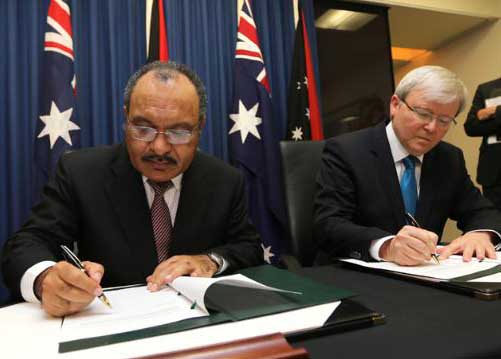
AUCKLAND (Pacific Media Watch / Sunday Chronicle / AAP / ABC Radio Australia): Papua New Guinean newspaper Sunday Chronicle left no one wondering what its stance is towards Australia’s plan to send asylum seekers coming by boat to Manus Island.
“Ruddiculous” was the headline of the latest edition of the Sunday Chronicle, according to the Australian Associated Press.
Australian Prime Minister Kevin Rudd and his Papua New Guinean counterpart Peter O’Neill last week unveiled a new plan to tackle boat refugees coming to Australia.
According to the plan, no asylum seekers coming by boat will be settled in Australia.
They will instead be transported to Manus Island or elsewhere in Papua New Guinea, where it will be determined whether their claim to refugee status are legitimate or not.
In the agreement that will be in place for the next 12 months, there is no cap on the number of refugees to be sent to Manus Island and Papua New Guinea.
The number of boat arrivals to Australia skyrocketed from 4565 in 2011 to 17,202 in 2012, according to the Australian government.
Critical editorial
In an editorial yesterday, the Sunday Chronicle complained that Kevin Rudd was involving Papua New Guinea in Australian domestic politics.
"He (Rudd) has unashamedly dragged our PM into Australian domestic politics under the guise of correcting a regional problem which in the long run will effect us all," it said. "The big question remains, where is PNG going to resettle those identified as genuine refugees."
As a part of the agreement, Manus Island detention centre will be expanded from its original capacity of 600 to house 3000 detainees.
A recent report from the United Nations High Commissioner on Refugees (UNHCR) was critical of the conditions at the Manus Island detention centre, and concluded that asylum seekers are living in cramped quarters and enduring slow processing arrangements.
According to the Papua New Guinean broadcaster EMTV, UNHCR was not consulted prior to Australia and Papua New Guinea signing last week’s agreement.
The UNHCR is now seeking more information from both governments on the agreement.
Bad for PNG
An editorial by Rowan Callick of The Australian and republished by the Papua New Guinean newspaper Post –Courier suggests that Australia has more to gain from the deal than Papua New Guinea.
“It also comprises an immense challenge to the capacity of PNG to deliver — a capacity which has been proven in vast private sector projects such as the $19 billion ExxonMobil led gas project, but has frequently failed in the public sector,” Callick writes.
Prime Minister Peter O’Neill, Callick argues, now has to convince Parliament that this deal is in Papua New Guinea’s interest and that “it does not sound like recolonisation or doing Canberra’s bidding.”
As part of the agreement, Australia has agreed to finance a highway and give A$ 160 million in health and hospital support.
The small opposition in the Papua New Guinean Parliament reacted negatively to the news of the deal.
“I would have expected the Prime Minister of the country, Peter O’Neill, to inform Parliament of Australia’s decision to ‘dump’ more asylum seekers on our land, and for parliament to debate the pros and cons of this major Australian policy,” Opposition whip Tobias Kulang said according to The National.
Religious tensions
Both Callick and ABC Radio Australia’s Liam Cochrane in Port Moresby, underline that Papua New Guinea is a Christian country and that most of the asylum seekers are Muslims.
“[T]he prospect of many thousands of Muslim arrivals will pose a huge challenge to community coherence,” Callick writes. Today there is only one modest sized mosque in the entire country.
“Papua New Guinea is Christian – in some parts a deeply Christian - country. There is a small population of Muslims, but as many thousands more come in, that reaction is something we will have to wait and see,” Cochrane says.
Furthermore, the legality of the new agreement has been challenged both by the opposition in Australia and human rights organisations.
Human rights advocate David Manne says that the new agreement may be in violation of the 1954 Refugees’ Convention committed to protecting people who come to its shores, not exposing them to further risks elsewhere.
Opposition leader Tony Abbott from the Liberal Party says that the new deal is "only something that is held together with Blu Tack and sticky taoe to last until the election if possibly."
Azadeh Dastyari, a Monash University law lecturer, is also critical stating that you "can't punish a refugee for the mode of arrival."
"The convention says it doesn't matter how a refugee comes into your country and what we are doing in Australia is saying that people who come by boat will have less of rights by being sent to PNG by people coming by plane who will continue to be processed in Australia," the lecturer said according to Radio New Zealand International.
This work is licensed under a Creative Commons Attribution-NonCommercial 3.0 New Zealand Licence.




